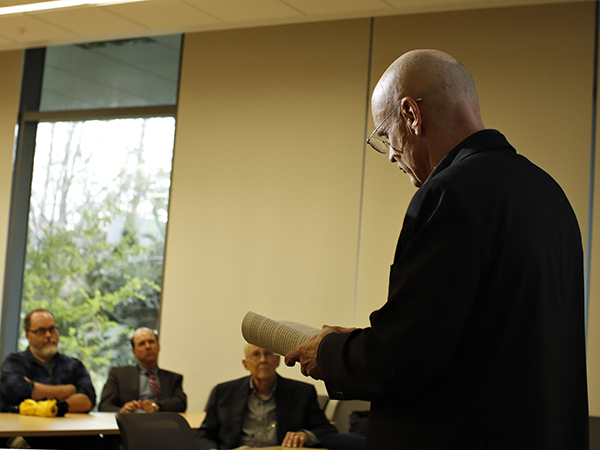A Pulitzer Prize-winning historian discussed the historical impact industry has had on the Gulf of Mexico on Tuesday as part one of the Littlefield Lecture Series, “Coming Ashore: History, Ecology, and the Gulf of Mexico.”
Jack E. Davis is a history professor at the University of Florida and received the 2018 Pulitzer Prize for History for his book, “The Gulf: The Making of an American Sea.” Davis said he wrote the book to restore the Gulf’s regional identity. The Littlefield Lecture Series explores the history of the South through an annual two-part series, according to UT’s events website.
“All Americans are connected to the Gulf of Mexico both ecologically and historically,” Davis said. “116 rivers run into the Gulf … (and) some sand in Florida came from the Appalachian Mountains.”
Davis also said many Americans overlook the importance of the Gulf’s role in the country’s history as Americans associate the Gulf with oil spills and hurricanes but leave it out of the country’s historical narrative, causing it to lose its identity.
Davis also said everyday products such as cereal have contaminated rivers which flow into the Gulf. Another example of pollution is the Escambia Bay in Alabama, where 95% of the seagrass bed was destroyed due to wastewater treatment, Davis said.
History professor emeritus David Gracy, who attended the lecture, said lectures like Davis’ reinforce students’ sense of history so that the next generation will not repeat mistakes of the past.
“We can learn from history by seeing how people exploited riches in the case of the Gulf of Mexico,” Gracy said. “There was wealth, and people had the view that it was unlimited so they exploited it beyond its ability to survive.”
Davis said he is somewhat optimistic of the region’s future because of conservation efforts.
“You have volunteer groups restoring the living shoreline,” Davis said. “The other thing that gives me hope are the millennials and Generation Zers. You guys know what our breakfast cereal left, and you guys don’t want any part of that.”
History department chair Jacqueline Jones said Davis’ book covers a wide range of topics outside of ecology.
“The Gulf covers tourism, leisure, the role of the Gulf and trade commerce … it’s a very rich book,” Jones said.
The second Littlefield Lecture this year, also from Davis, will be called “A Southern Sea and an American Bird: Reflections on the Environmental Humanities.”





















